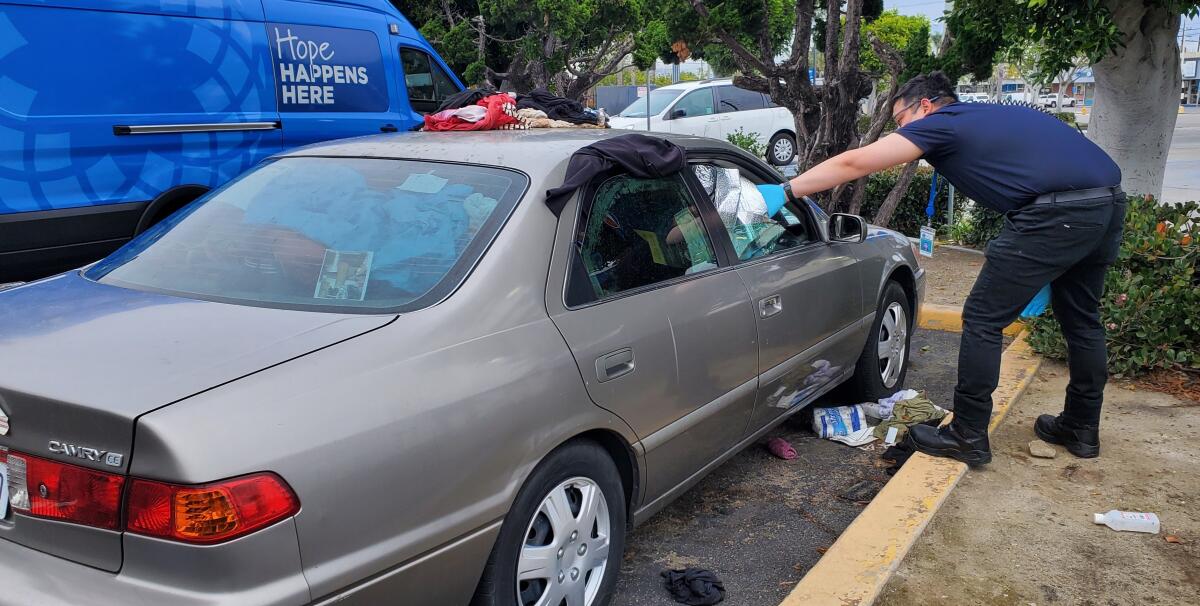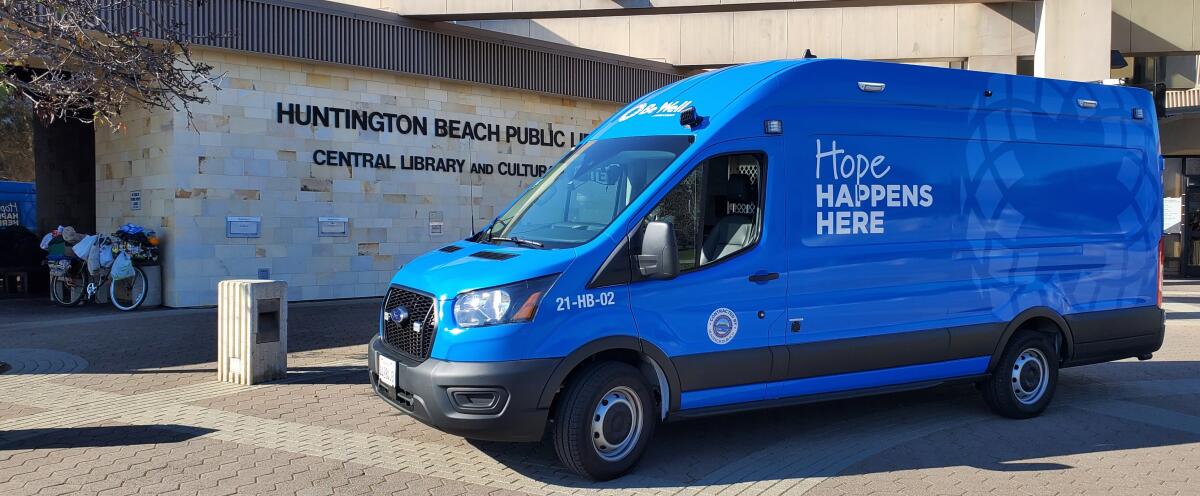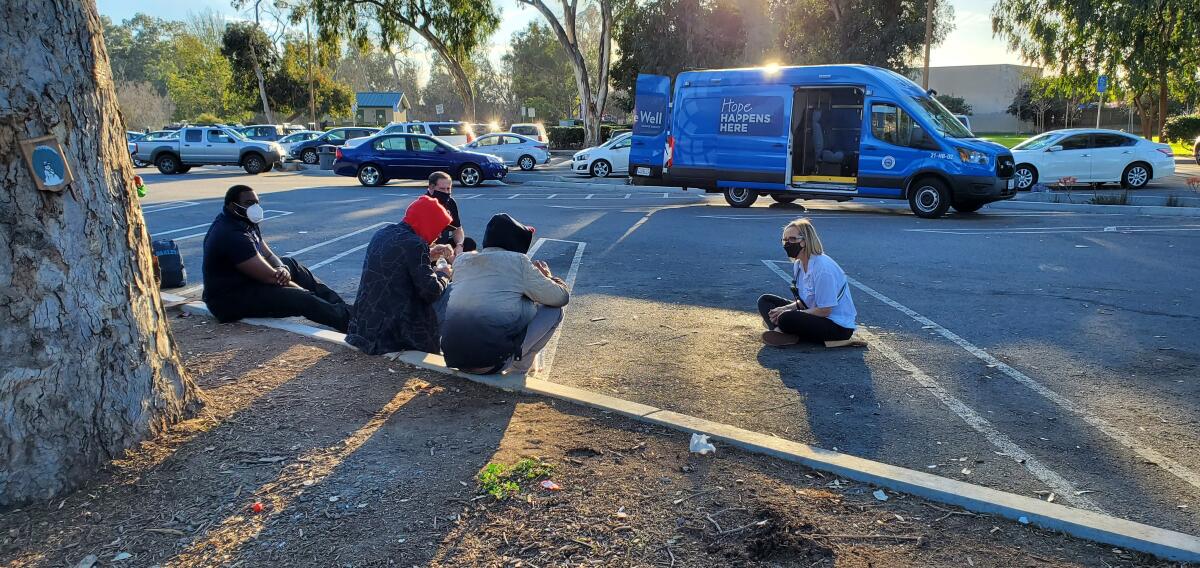Huntington Beach Mobile Crisis Response team handled over 2,000 calls in first year of operation

- Share via
Outreach takes many forms, according to Michael Romero, a licensed psychiatric technician with the nonprofit, Be Well OC. Washing the swollen feet of a man who had spent days going barefoot and helping a distraught homeless person on the verge of a public breakdown track down a missing dog are just a couple of services he has offered as a member of Huntington Beach’s Mobile Crisis Response Team.
The team was created in August 2021 as a partnership between the nonprofit and the police department and is the first of its kind in Orange County, Romero said. It is made up of counselors and sworn officers who respond in plain clothes to both 911 calls involving mental health issues and requests for aid from a nonemergency line, (714) 960-8825. This is done at no cost to those in need of help.

Team members also go to places where homeless people are camping to offer shelter and other forms of aid. In their first year on the job, they have connected over 1,200 clients to mental health services, substance abuse treatment and housing assistance, Huntington Beach Police spokeswoman Jessica Cuchilla said.
About 49% of the clients assisted by Be Well OC in Huntington Beach have been homeless people, according to Jason Austin, the deputy director of HBPD’s Homelessness and Behavioral Health program. The rest were introduced to their aid as a result of some of the 2,040 calls the Mobile Crisis Response Team was dispatched to over the past year.
Of those requests, about 73% were handled without assistance from other responders, Cuchilla said. The overwhelming majority, a total of 1,548, were looking for mental health support, according to statistics shared by the nonprofit. Another 133 were seeking help dealing with substance abuse. Only 67 were related to a public disturbance.
The people who get help from the crisis teams come from all walks of life, said Tameka Tates, Be Well OC’s director of Mobile Services. Many were hesitant to seek assistance through traditional means.
Meeting people at their homes can circumvent the stigma associated with seeking care and other barriers that keep people from getting treatment, Tates said.
That makes it easier for the crisis team to get them to “push through in that first contact so that maybe they’re willing to follow through and then engage in some kind of ongoing treatment,” according to Austin.
Assigning the team to take care of calls regarding mental health crises keeps police and firefighters available to tackle other issues, Cuchilla said. And it’s easier for those who need help in these situations to talk to people in regular clothing rather than to uniformed officers, Police Lt. Bryan Smith said.
Smith is a member of the crisis team. He said he used to see the apprehension rise in people around him whenever he would respond to calls involving a mental health issue while wearing a gun and handcuffs strapped to his belt. Regardless of what he might say to de-escalate the situation back then, the people he was trying to help couldn’t ignore the fact that it was possible he might arrest them, or even shoot someone if things took a turn for the worse.
And he had to leave if a crime in progress came up while he was trying to work with someone on the verge, or in the midst, of a breakdown. Another officer might be able to show up later to take his place, which means the person they are trying to aid or their relatives would have to rehash their emergency to another first-responder.
“It can be traumatizing to have to reexplain the situation, sometimes three or four times and to different people each time,” Bryant said.
Unlike police, Be Well OC’s sole mission in Huntington Beach is to bring mental health care to people wherever they might need it, Austin said. That means they can commit to the calls they receive without distractions. The crisis team also conducts follow-up visits with their clients to make sure they have the support they need to move forward.
“This really filled an important void that was out there for the continuum of care,” Smith said. “Because from the public safety side, our response was along the lines of: ‘how can we immediately resolve this situation.’ And then our involvement was either cut off there or we transport them to an emergency medical facility, nothing in the middle.”

The start of Be Well OC’s partnership with Huntington Beach Police came more than a year after the killing of George Floyd in Minneapolis resulted in nationwide scrutiny of law enforcement and suggestions to reinvest public money away from police departments and into social services.
When counselors and police came together to form the crisis team, there were members of the department who were hesitant to see the team take over roles previously held by sworn officers, Smith said. Meanwhile, some at the non-profit worried that the rigid structure and culture of the police department might place restrictions on the way it served its clients, according to Romero.
But despite their misgivings, Romero and Smith said the two groups have built a seamless and cooperative relationship with each other.
“Huntington Beach was the first city to launch a program like this, and we’ve learned a lot from it,” Romero said.
Huntington Beach officials signed a $1-million contract with Be Well OC to enlist its services over the past year. Although some on social media have questioned the cost of the program, “The city sees the tremendous value in this program to help the most vulnerable,” Cuchilla said.
All the latest on Orange County from Orange County.
Get our free TimesOC newsletter.
You may occasionally receive promotional content from the Daily Pilot.




